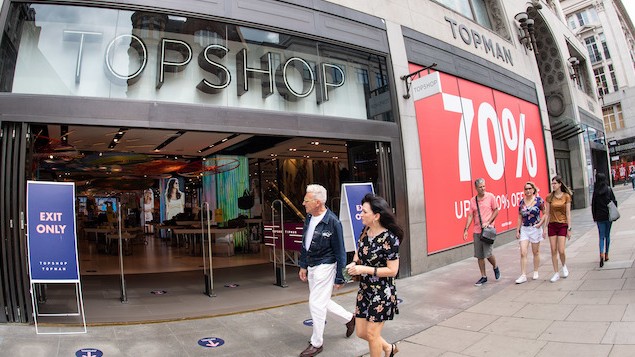[ad_1]

Arcadia Group, which owns Top Shop, is one of the latest retailers to announce job cuts
Matt Crossick/Matt Crossick/Empics Entertainment
Retailers in the UK cut jobs at the fastest rate since 2009 over the last 12 months, according to the CBI’s latest data on distributive trades.
Its survey of 128 businesses, including 63 retailers, forecasts worse to come in the year to September. Decline was felt across all retail sectors, with only groceries, furniture and carpets, and ‘non-store’/other goods seeing growth.
Employment in the retail sector fell 45% in the year to July compared to a drop of 20% in the year to May. The quarter ahead will bring an even sharper decline of 52%, the CBI predicts.
The CBI’s figures reflect a series of announcements from retailers in the past weeks and months, including Marks & Spencer cutting more than 7,000 roles, John Lewis announcing 1,300 jobs losses and 4,000 redundancies at Boots.
Topshop owner Arcadia Group also plans to make around 500 roles redundant, and was yesterday accused of wrongly basing notice pay on furlough pay rather than full salary.
Retail sales fell by 6% in the year to August, according to the CBI, compared to a slight rise in the year to July. However, the CBI believes sales will drop by 17% next month.
However, the number of retail organisations who believe the business situation will improve moderately over the next quarter has gone up by 7%, compared to -33% in May.
Alpesh Paleja, lead economist at the CBI, said the Coronavirus Job Retention Scheme had been effective at “insulating workers and businesses in some of the worst-hit sectors during the pandemic”, but that job losses had simply been “delayed rather than avoided”.
“Indeed, the latest survey shows that trading conditions for the retail sector remain tough, even against the backdrop of business slowly returning. Firms will be wary of deteriorating household incomes and the risk of further local lockdowns potentially hitting them in the pocket for a second time,” he said.
“As a result, further support may well be needed for the retail sector if demand continues to disappoint. Extending business rates relief will go a long way towards alleviating pressure on retailers’ cash flow.”
Many retailers were already making restructuring plans when the pandemic hit, reflecting shifts in consumer behaviour towards online shopping, but coronavirus and subsequent lockdowns accelerated this trend.
The CBI data was accompanied by news of further job losses on the high street. The Co-operative Bank said this morning it would cut around 350 jobs and close 18 branches due to “prolonged economic uncertainty”.
Those working at the affected branches, middle management and head office roles are those likely to be affected, the bank said.
Chief executive Andrew Bester said the record low Bank of England interest rate of 0.1% – which makes it difficult for lenders to make profits – made the cuts necessary.
Bester said: “Unfortunately, we’re not immune to the impact of recent events, with the historically low base rate affecting the income of all banks and a period of prolonged economic uncertainty ahead, which means it’s important we reduce costs and have the right-sized operating model in place for the future.”
HR roles in retail and wholesale on Personnel Today
Browse more HR roles in retail and wholesale
[ad_2]
Source link





